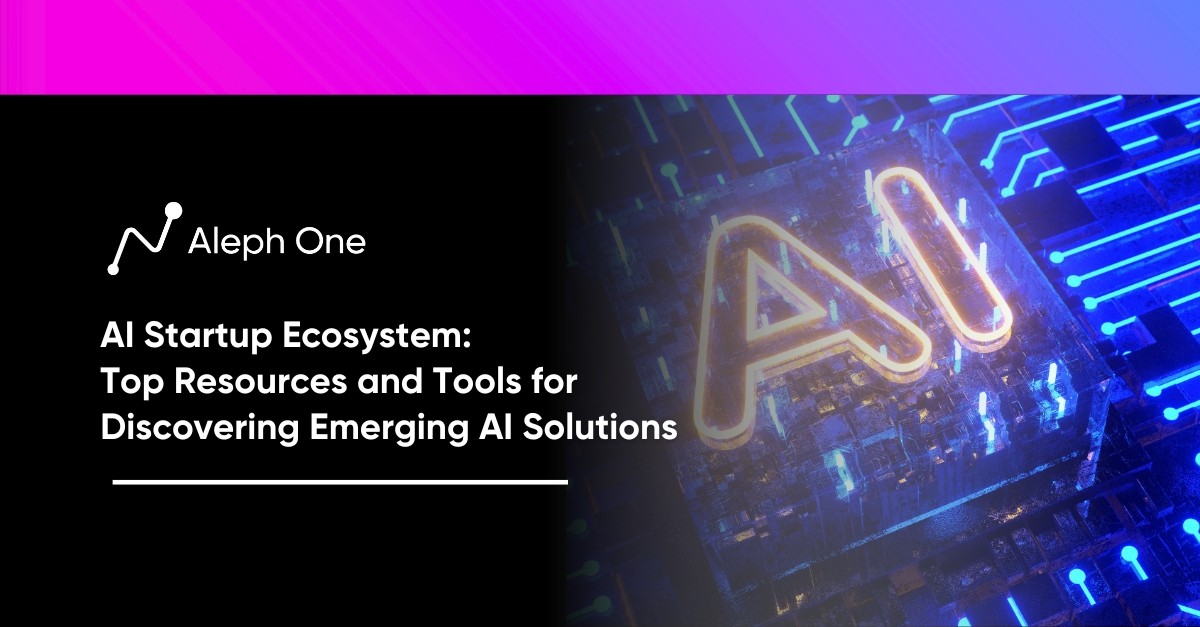Let’s work together to build something amazing. Share your project details and our team will reply to figure out the next steps to your success.

In 2021, AI startups secured an unprecedented $73.5 billion in funding, marking a staggering 138% increase from the previous year, according to Pitchbook data. This funding surge underscores the escalating excitement surrounding AI innovations, with venture capital firms and corporate investors rapidly injecting capital into startups, aiming to support breakthrough technologies and success stories. Although this influx of funding has fueled rapid growth for select startups, it has also intensified competition, demanding strategic utilization of funds to achieve critical milestones and maintain a competitive edge. As the AI startup landscape continues to evolve, those capable of navigating this dynamic ecosystem stand poised to drive innovation and shape the future of AI.

Anthropic, TuSimple, and Insitro
Some of the largest funding rounds in 2021 went to AI companies. For example, the AI safety startup Anthropic raised $124 million, self-driving truck firm TuSimple raised $1.35 billion, and AI-powered biotech startup Insitro raised $400 million. These mega-rounds enable startups to scale rapidly by hiring top talent, building technology infrastructure, and expanding into new markets.
AI Ecosystem is Becoming Competitive
However, the influx of capital also means the ecosystem is becoming increasingly competitive and crowded. AI startups now have to fight for attention from investors, partners, and customers. They also face pressure to deploy large funding rounds quickly and effectively to achieve key business milestones. Startups that cannot do so risk losing their momentum and competitive edge.
Raising Seed and Series A Funding is Easier
The huge amounts of available funding present opportunities and challenges for new AI startups. On the one hand, raising seed and Series A funding to get a startup off the ground is easier than ever. But raising follow-on rounds is more difficult as investors have more choices and higher expectations. Startups need a combination of technological innovation, business model traction, and talent to stand out. They also need to be flexible in an environment where change is rapid.
The surge in AI funding enables tremendous opportunities for innovation and intensifies competition. Startups that can leverage this funding strategically to build strong foundations will be well-positioned to shape the next wave of progress in AI. The future remains bright for startups with a compelling vision, breakthrough technology, and the ability to execute.
The Rise of AI-as-a-Service: How Startups are Democratizing AI
An emerging trend in the AI startup ecosystem is the rise of companies offering AI-as-a-service. These startups are developing AI-based services and tools that make it easy for other companies to implement AI in their businesses without building complex AI systems from scratch. For example, startups like Anthropic offer AI safety-as-a-service, providing tools for aligning language models and ensuring AI systems behave ethically.
Clarifai and Amazon Rekognition
Computer vision API startups like Clarifai and Amazon Rekognition are also popularizing AI-as-a-service. They offer image and video analysis APIs that allow developers to add computer vision capabilities to their applications easily. This includes functionality like facial recognition, object detection, explicit content moderation, and more. These pre-built AI services eliminate the need for companies to develop their own computer vision models and infrastructure.
Conversational AI Chatbots
Chatbot platforms are another type of AI-as-a-service, enabling businesses to quickly deploy conversational AI chatbots to automate customer service and other processes. Startups like Anthropic, Chatfuel, and Botpress offer no-code or low-code chatbot creation platforms, abstracting away the complexity of natural language processing and neural networks. Companies can sign up, choose a template, and build a customized chatbot through an intuitive interface.
Solve Business Needs with AI
The key to success for startups in this space is providing simple, affordable, and robust AI services that solve real business needs. They should focus on verticals and use cases that would otherwise require companies to invest heavily in AI expertise and resources to address. Partnerships are also crucial for gaining distribution and new customers. For example, partnering with cloud providers to offer their AI services on top of existing platforms.
The rise of AI-as-a-service startups is helping to democratize AI and make its capabilities more accessible to companies that don’t have the means to build their own AI systems from the ground up. By handling the AI complexity behind the scenes, these startups are opening up more opportunities for AI adoption across industries and at a larger scale. Overall, this trend is shaping a more vibrant and collaborative AI ecosystem.
Why AI Applications and Vertical AI Startups are Thriving
AI applications and vertical AI startups are experiencing massive growth due to their ability to solve specific, high-value customer problems. These startups apply AI to optimize key business processes and workflows in various industries.
AI Enabling Retail, Healthcare, and Transportation
For example, AI applications for computer vision enable startups in retail, healthcare, and transportation. Startups like AnyVision use computer vision for facial recognition and video analytics in retail stores. AI is powering startups like Arterys that leverage machine learning to analyze medical scans in healthcare. In transportation, computer vision helps startups like May Mobility coordinate self-driving vehicle fleets.
Vertical AI Startups
Vertical AI startups also thrive by focusing on industry-specific problems. In healthcare, AI startups use machine learning to analyze patient data, improve diagnostics, and optimize treatment plans. Startups like Enlitic and Zebra Medical Vision offer AI solutions for medical imaging analysis. In finance, AI startups help with applications like fraud detection, algorithmic trading, and customer service. For example, Anthropic focuses on AI safety for financial institutions.
Identify High-Value Problems in Specific Industries
New AI startups looking to tap into these opportunities should identify high-value problems in a specific industry or application area. They can then develop AI solutions tailored to customers’ unique needs in that vertical. Partnering with industry leaders is also a proven strategy. Startups should consider licensing their technology to established companies or co-developing solutions.
New startups can thrive in the applications and vertical AI markets with a focused strategy, strong industry partnerships, and the right AI capabilities. The key is solving real-world problems for customers with innovative AI technology. By delivering measurable value and results, AI startups in these areas will continue to gain momentum and funding in the coming years. The applications and vertical layers of the AI stack present very compelling opportunities for new startups.
The Talent Wars: How Startups are Competing for Scarce AI Skills
AI startups are facing intense competition for top AI talent. With demand for AI skills far outstripping supply, startups must get creative to attract and retain scarce AI talent. According to Glassdoor, the average salary for an AI engineer in the U.S. is over $114,000. However, top AI talent can command compensation packages of $300,000 or more at major tech companies like Google, Facebook, and Microsoft.
Equity Stake
To compete, many AI startups offer sizable equity stakes, the opportunity to work on challenging problems, and a high degree of autonomy. For example, Anthropic, an AI safety startup, offers engineers equity, potentially worth millions of dollars. Other startups are building strong engineering cultures with benefits like generous healthcare plans, paid time off, and learning and development programs.
Adjacent Skill Sets
Some startups hire engineers with adjacent skill sets, like software engineers, physicists, or mathematicians, and provide in-house AI training programs. For example, Zoox, an autonomous vehicle startup, has an in-house “AI residency” program to train engineers with related backgrounds in machine learning. This approach allows startups to tap into a wider talent pool and “home grow” AI talent.
Partnering with Universities
Partnering with universities is another strategy. Startups are working with universities to create AI courses and curriculum, sponsor master’s programs in AI, and host hackathons and competitions to identify promising students. For example, Anthropic has partnered with several universities to develop a new AI safety and ethics curriculum. This helps startups build relationships with students and gain access to cutting-edge research.
AI talent is scarce, but AI startups can still compete with creativity, resourcefulness, and the right culture. Building strong engineering cultures, offering ownership and equity, partnering with universities, and retraining related talent are some strategies startups use to navigate the talent wars. For any new AI startup, focusing on recruiting, developing and retaining top talent should be a priority to gain a competitive advantage.
AI Startups to Watch in 2022
Several AI startups are poised for major growth and success this year. Anthropic, an AI safety startup based in San Francisco, raised $20 million to build techniques for aligning AI systems with human values. Their work on “Constitutional AI” is promising and could help address risks from advanced AI. Scale AI, a startup providing data and AI to enhance perception in self-driving cars, raised $325 million at a $7.3 billion valuation. With partnerships with major automakers like GM and Toyota, Scale AI is well-positioned to enable the next generation of autonomous vehicles.
Anthropic, Scale AI, and Clarifai
Clarifai, an AI company focused on computer vision and deep learning, raised $30 million to expand their AI platform for image and video analysis. They work with companies in ecommerce, media, and other industries to build custom computer vision solutions. As computer vision continues to gain traction, Clarifai is poised for strong growth. Anthropic, Scale AI, and Clarifai demonstrate how startups focused on crucial and emerging areas of AI, like AI safety, autonomous vehicles, and computer vision, can thrive.
Babylon Health, Olive, and BenevolentAI
In healthcare, startups like Babylon Health, Olive, and BenevolentAI use AI to improve diagnostics, streamline administrative processes, and accelerate drug discovery. Babylon Health, an AI-powered symptom checker and telehealth app, reached a $4.2 billion valuation last year. Olive, an AI assistant for healthcare administrators, raised $400 million at a $4 billion valuation. BenevolentAI, a leader in AI for drug discovery, raised $90 million in a funding round led by Novartis and reached a valuation of over $2 billion. The opportunities for AI in healthcare are vast, signaling the major potential for startups in this space.
These startups and others successfully demonstrate how to build an AI company in 2022. They are focused on high-potential areas, forging partnerships, recruiting top talent, and leveraging their expertise to solve important problems. For new startups, these companies provide a blueprint for navigating the AI ecosystem and building a thriving business centered around artificial intelligence. The future is bright for AI startups, and companies like Anthropic, Scale AI, Clarifai, Babylon Health, Olive, and BenevolentAI are leading the way.
Partnerships Powering the AI Ecosystem
Partnerships have become a driving force in the AI startup ecosystem. Collaborations between startups, tech giants, and enterprises enable faster innovation, broader distribution, and real-world implementation of AI technologies.
Technology, Data, and Distribution Channels
Startups are partnering with large tech companies to gain access to technology, data, and distribution channels. For example, AI safety startup Anthropic partnered with Microsoft to gain access to computing infrastructure, while AI writing startup Anthropic partnered with Google to integrate its technology into Google’s products. These partnerships allow startups to scale rapidly with the help of tech giants.
Licensing Deals, Joint Ventures, and Pilot Programs
Enterprises are partnering with startups through technology licensing deals, joint ventures, and pilot programs to accelerate their AI capabilities. For instance, Walmart has partnered with several robotics and computer vision startups to automate various operations. Startups get access to real-world data and use cases, while enterprises get a head start on AI implementation.
Startup Collaborations
Startups are also collaborating to combine their strengths. For example, robotic process automation startup UiPath partnered with AI computer vision startup Vicarious to automate more complex workflows. Through partnerships, startups can offer more robust end-to-end solutions to customers.
Strategic Alignments and Mutually Beneficial Terms
Finding strategic alignment and mutually beneficial terms is the key to a successful partnership. Startups should look for partners that complement their technology and share their vision. They must articulate a clear value proposition to potential partners based on their unique strengths. It is also important to maintain flexibility in negotiations to create a win-win partnership.
AI Startups can Gain a Competitive Edge
With the right collaborative strategies and partnerships, AI startups can gain a competitive edge, tap into new opportunities, and shape the future of industries. The AI ecosystem will continue to be powered by the knowledge, skills, and resources flow between startups, tech companies, and enterprises. Partnerships are poised to drive further progress in AI and its applications.
FAQ
How are AI startups managing the increasing pressure to deploy large funding rounds quickly and effectively?
Startups managing the pressure to utilize large funding rounds are pursuing various strategies. Primarily, they outline clear deployment plans during the funding phase, ensuring financial and operational targets are well-aligned. They also focus on aggressive hiring to bring in specialized talent that can effectively leverage the funds. Another common approach is incorporating a strong advisory board to help guide fund usage, particularly in tech development and market expansion.
In what ways are AI-as-a-service startups democratizing AI and making it more accessible to other companies?
AI-as-a-service startups are democratizing AI by offering specialized services that negate the need for companies to develop their own complex AI systems. These startups provide pre-built AI systems catered to unique business requirements, which businesses can easily integrate within their existing infrastructure. They eliminate complexities by simplifying natural language processing, computer vision capabilities, and predictive analytics. Thus, companies can save substantial costs and time compared to building their own AI system.
What strategies are AI startups employing to compete for scarce AI talent?
To compete for scarce AI talent, startups are deploying a multi-faceted approach. They are leveraging equity offerings as a compelling incentive for potential hires, promising a share in the company’s potential success. Furthermore, startups are focusing on building a strong company culture that values innovation, work-life balance, and continuous learning as a means to attract talent. Finally, they are establishing partnerships with universities, offering AI residency programs, and creating AI curriculum courses that allow them to groom and attract emerging AI talent.
Get the latest news and updates from Aleph One in your inbox.



